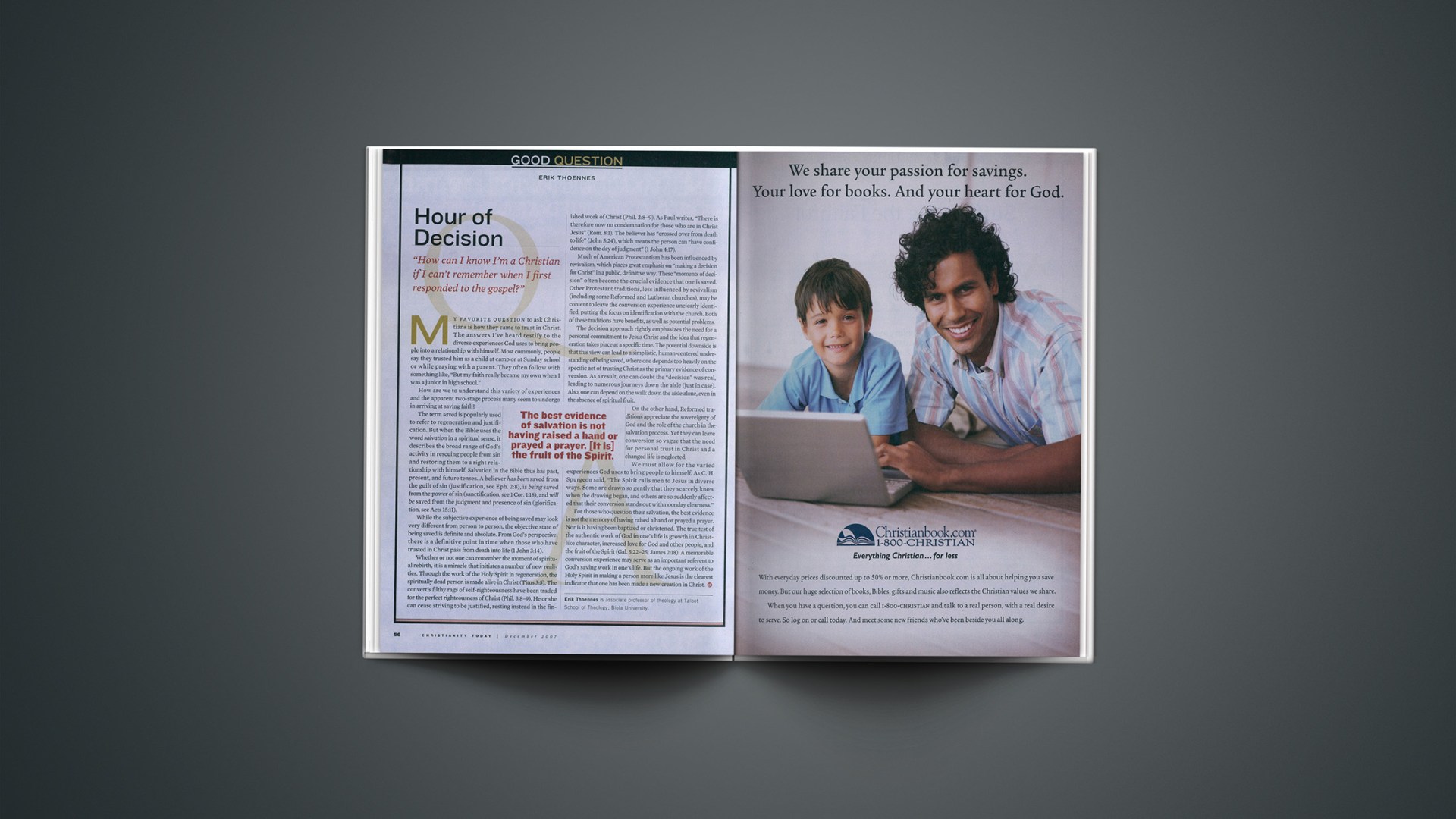My favorite question to ask Christians is how they came to trust in Christ. The answers I've heard testify to the diverse experiences God uses to bring people into a relationship with himself. Most commonly, people say they trusted him as a child at camp or at Sunday school or while praying with a parent. They often follow with something like, "But my faith really became my own when I was a junior in high school."
How are we to understand this variety of experiences and the apparent two-stage process many seem to undergo in arriving at saving faith?
The term saved is popularly used to refer to regeneration and justification. But when the Bible uses the word salvation in a spiritual sense, it describes the broad range of God's activity in rescuing people from sin and restoring them to a right relationship with himself. Salvation in the Bible thus has past, present, and future tenses. A believer has been saved from the guilt of sin (justification, see Eph. 2:8), is being saved from the power of sin (sanctification, see 1 Cor. 1:18), and will be saved from the judgment and presence of sin (glorification, see Acts 15:11).
While the subjective experience of being saved may look very different from person to person, the objective state of being saved is definite and absolute. From God's perspective, there is a definitive point in time when those who have trusted in Christ pass from death into life (1 John 3:14).
Whether or not one can remember the moment of spiritual rebirth, it is a miracle that initiates a number of new realities. Through the work of the Holy Spirit in regeneration, the spiritually dead person is made alive in Christ (Titus 3:5). The convert's filthy rags of self-righteousness have been traded for the perfect righteousness of Christ (Phil. 3:8-9). He or she can cease striving to be justified, resting instead in the finished work of Christ (Phil. 2:8-9). As Paul writes, "There is therefore now no condemnation for those who are in Christ Jesus" (Rom. 8:1). The believer has "crossed over from death to life" (John 5:24), which means the person can "have confidence on the day of judgment" (1 John 4:17).
Much of American Protestantism has been influenced by revivalism, which places great emphasis on "making a decision for Christ" in a public, definitive way. These "moments of decision" often become the crucial evidence that one is saved. Other Protestant traditions, less influenced by revivalism (including some Reformed and Lutheran churches), may be content to leave the conversion experience unclearly identified, putting the focus on identification with the church. Both of these traditions have benefits, as well as potential problems.
The decision approach rightly emphasizes the need for a personal commitment to Jesus Christ and the idea that regeneration takes place at a specific time. The potential downside is that this view can lead to a simplistic, human-centered understanding of being saved, where one depends too heavily on the specific act of trusting Christ as the primary evidence of conversion. As a result, one can doubt the "decision" was real, leading to numerous journeys down the aisle (just in case). Also, one can depend on the walk down the aisle alone, even in the absence of spiritual fruit.
On the other hand, Reformed traditions appreciate the sovereignty of God and the role of the church in the salvation process. Yet they can leave conversion so vague that the need for personal trust in Christ and a changed life is neglected.
We must allow for the varied experiences God uses to bring people to himself. As C. H. Spurgeon said, "The Spirit calls men to Jesus in diverse ways. Some are drawn so gently that they scarcely know when the drawing began, and others are so suddenly affected that their conversion stands out with noonday clearness."
For those who question their salvation, the best evidence is not the memory of having raised a hand or prayed a prayer. Nor is it having been baptized or christened. The true test of the authentic work of God in one's life is growth in Christ-like character, increased love for God and other people, and the fruit of the Spirit (Gal. 5:22-25; James 2:18). A memorable conversion experience may serve as an important referent to God's saving work in one's life. But the ongoing work of the Holy Spirit in making a person more like Jesus is the clearest indicator that one has been made a new creation in Christ.
Erik Thoennes is associate professor of theology at Talbot School of Theology, Biola University.
Copyright © 2007 Christianity Today. Click for reprint information.
Related Elsewhere:
Previous Good Questions are available on our site.
Erik Thoennes also answered a Good Question about whether "some people are lost just a little bit in the same way that others are saved only as through fire."










